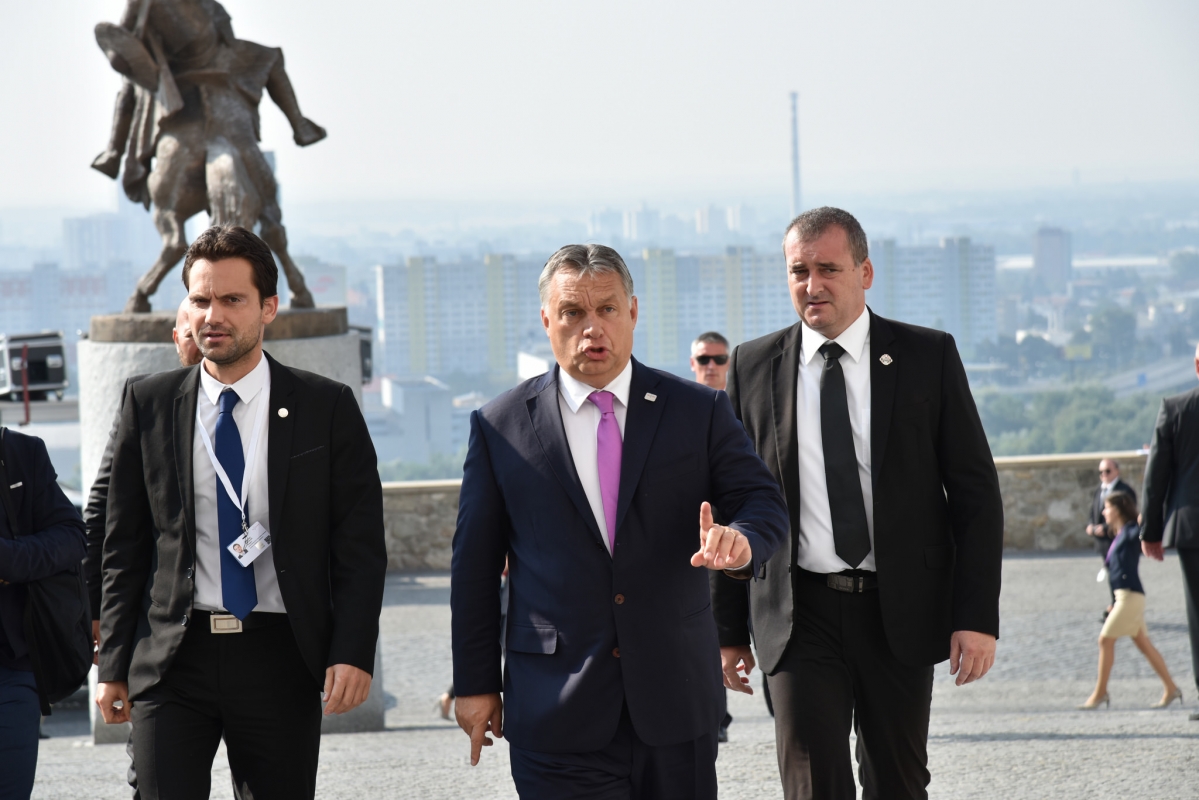Elections in Hungary. Viktor Orban wins a new mandate

(B2) The current Hungarian Prime Minister, a member of the European People's Party, is the favorite to win a third legislative election in a row on Sunday and consolidate an “illiberal” power in Hungary which claims to profoundly transform the country.
Make changes irreversible
Admired by the European populist right, hated by those who accuse him of authoritarian drift, the Prime Minister is aiming for a new four-year term to make "irreversible", in his own words, the changes initiated since his return to the head of government , in 2010. His national-conservative party, Fidesz, is credited with a lead of twenty to thirty points in the polls. But the opposition cherishes the hope of capitalizing on the weariness of some voters with Viktor Orban's diatribes against the billionaire Georges Soros and the migratory "threat", obsessions of his campaign.
Everything except Orban... difficult
Opinion polls show that a slight majority of the eight million voters want a change of government and many calls for unity against Fidesz have been launched. " There is anger in the air, and a danger for Orban if the people who have turned away from politics in recent years will vote en masse “, estimates Andras Biro-Nagy, analyst of the Policy Solutions group interviewed by AFP.
Corruption charges
Numerous allegations of corruption have targeted Viktor Orban's entourage. Overwhelmed by the government's increasingly nationalist rhetoric, the far-right Jobbik party presented itself as a party to the " clean hands ". At the end of February, the Prime Minister's party suffered a setback in a partial municipal election in one of its strongholds, where the opposition had rallied behind a single candidate, from an alliance that was anachronistic to say the least between the left and the extreme right. But at the national level, this gathering is difficult to imagine and leaves a boulevard to Viktor Orban, 54, who has tied himself to the concept " of illiberalism », a governance that assumes to limit certain freedoms in the name of the national interest.
A showdown with Brussels
The leader has multiplied the standoffs with the European Union. In 2015, he took the lead of the camp of countries hostile to the reception of refugees in Europe via a quota mechanism. His defense of a "Christian Europe" threatened by "the migratory invasion" made him an icon of the most radical European rights. The European Commission has in recent months launched infringement proceedings against Hungary over laws threatening a Hungarian university funded by Georges Soros and tightening control over civil society organisations. But Viktor Orban's political family at European level, the European People's Party (EPP) to which Angela Merkel's CDU also belongs, has never withdrawn its support.
No exit for Budapest
And while Hungary is opposed to closer EU integration, it has never threatened to leave the Union. The country is indeed one of the main beneficiaries of European funds which have contributed to its renewed economic dynamism, after the crisis of the end of the 2000s. This economic assessment was one of the main arguments of the government in a campaign where the prime minister took no part in any debate, contenting himself with carefully staged public appearances. NB: communication is also one of the key points of the Hungarian leader. Thus he communicates a lot in front of the international press during European summits, preferring a communication, licked, via social networks or videos recorded for the Hungarian public.
The purge of communism...
By promulgating hundreds of laws since 2010 reforming all institutions - media, justice, economy, culture - the Fidesz of Viktor Orban, already Prime Minister between 1998 and 2002, has rebuilt a framework and purged the vestiges of communism, argue his supporters . These reforms have undermined the rule of law and led to a decline in democratic values, criticize the opposition and many international observatories. " Hungary moves away from Europe in favor of Russian sphere of influence “, Estimates the left candidate Gergely Karacsony.
... or the assurance of personal power
In 2010 and 2014, Viktor Orban had won a super majority of two-thirds which this time seems out of reach, even if the Prime Minister has continued to dramatize the issue of the ballot, castigating the enemies of Hungary who " want to dispossess (us) of (our) country while “mass migrations” are underway. He also said he wanted to take "moral, political and legal" measures against his opponents after the legislative elections.
A liberal who has gone over to the camp of illiberalism
Viktor Orban was not always this self-proclaimed defender of a "Christian Europe", assuming a certain authoritarian style. Co-founder in 1988 of the Alliance of Young Democrats (Fidesz), he appears as a symbol of Hungary's aspirations to free itself from totalitarianism and adopt Western values. He positions himself rather as a left-liberal (very close to what could be an Emmanuel Macron today). A year later, in June 1989, at the age of 26, he made himself known, he challenged the communist regime in Budapest with a fiery speech, for freedom, during a tribute to the victims of the 1956 Uprising.
Giving up power a humiliation
Prime Minister in 1998, he must however relinquish power four years later after a crushing defeat against the Socialist Party, heir to the former Communists. A humiliation he will never forget. This abandonment of power, this humiliation, he does not want to relive it. Returning to power in 2010, when the country was deeply shaken by the economic crisis and by scandals linked to the previous left-liberal government, he never ceased to cement his power, first of all by tightly controlling his party , and then by maintaining the grip of his party on the main institutions of the country (justice, press, research centers, universities, etc.) in the name of the salvation of the “Hungarian nation”.
The little father of illiberal democracy
Comfortably re-elected in 2014, this father of five children claims the exercise of an "illiberal democracy" and proclaims his admiration for Russian President Vladimir Putin, whom he is the first EU leader to welcome after the annexation of Crimea. The criticisms of the European Union or the United States on the attack on the balance of powers or on its refusal to welcome refugees have only marginally changed its policy. On the contrary, faced with a weakened German Chancellor Angela Merkel, he now feels comforted by the policy he implemented during the wave of migration in 2015, notably erecting hundreds of kilometers of barbed wire fence to block the refugees.
The link between terrorism and illegal immigration
The Paris attacks of autumn 2015, perpetrated in part by jihadists who arrived from Syria, completed in his eyes to prove that illegal immigration was a "poison". A link that he is not the only one to make in the various leaders of the former Eastern Europe, some openly, others more discreetly. In the aftermath, Viktor Orban made George Soros his favorite scapegoat, accusing the American Jewish billionaire, who funds many civil rights NGOs in Europe, of providing a “plan” intended to drown Europe in migrants, in a campaign with anti-Semitic overtones. Hungary's Enemies do not believe in work but speculate with money. They have no homeland but believe the world is theirs “, he hammered in a recent speech.
Passionate about football, power
Born on May 31, 1963, this football enthusiast who grew up in a locality near Budapest nevertheless went to Oxford University … thanks to a scholarship from the same George Soros. Opportunist or visionary? " That's the million dollar question “says Andras Schweitzer, from the Eotvos Lorand University in Budapest. One thing is certain, however, according to him: most of Orban's interlocutors " recognize his talent and his art of quickly understanding things ". But despite unemployment at its lowest (3,8%) and dynamic growth (4% in 2017), a form of weariness is beginning to emerge in a country undermined by clientelism. And the systematic use of anti-migrant rhetoric seems to have reached its limits.
An authoritarian or a pragmatist
« Hungarian society is smarter than that “, recognized Andras Bencsik, an editorialist yet close to the Fidesz party of Mr. Orban. The opposition accuses the leader of trying to hide the "real" problems: corruption, health, education, purchasing power. What lesson will he learn from this? For most analysts, Viktor Orban is above all a " pragmatic » listening to the fundamental trends of Hungarian society and knowing how to backtrack when he deems it necessary. The man who has been affectionately called a "dictator" by Commission President Jean-Claude Juncker has always been careful not to cross the red lines completely, while his country depends on EU funds for almost all of its its structural investments.
(NGV with AFP)


